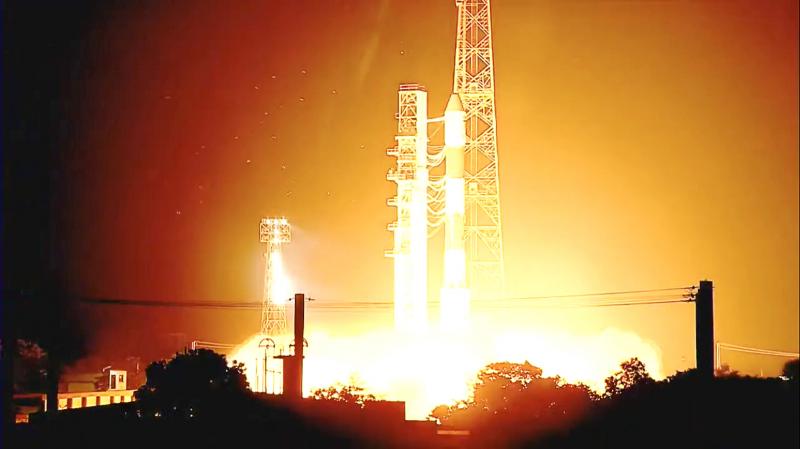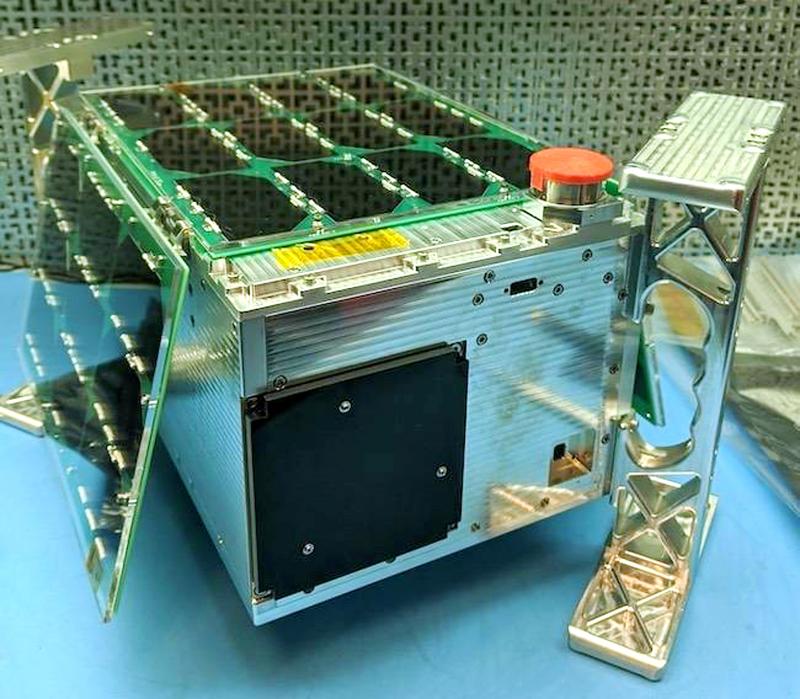A scientific microsatellite jointly developed by institutions in Taiwan, the US and India was launched yesterday morning, representing a major milestone in scientific collaboration and the nation’s achievements in space research.
The INSPIRESat-1 microsatellite was launched at 8:29am Taipei time from Satish Dhawan Space Centre in Sriharikota, India.
The US received a signal from the satellite when it passed overhead at 9:30am, while Taiwan is expected to detect a signal at about 5pm today.

Photo: screen grab from ISRO live-streaming
It is to remain in sun-synchronous orbit at an altitude of 525km, where it is to collect data for participating institutions to use in scientific research.
The satellite has a mission life of one year and a primary minimum requirement of six months for science operations.
The successful launch is the culmination of four years of collaborative research and development under the International Satellite Program in Research and Education (INSPIRE), a consortium of universities with space science departments.

Photo courtesy of the University of Colorado LASP
It also marks the first collaboration between a Taiwanese academic institution, National Central University (NCU) and the Indian Space Research Organization, which was responsible for launching the satellite on its Polar Satellite Launch Vehicle.
The Indian Institute of Space Science and Technology has primary flight control, with assistance by NCU and the University of Colorado, Boulder.
One of its two major payloads is a compact ionospheric probe developed by NCU for studying the Earth’s dynamic ionosphere.
The other is a dual-zone aperture X-ray solar spectrometer developed by the University of Colorado, Boulder, with funding from NASA for studying highly variable solar X-ray radiation, together forming a kind of space weather station.
In a news release, the Ministry of Science and Technology touted federal programs that supported NCU professor Loren Chang (張起維) as he pursued the collaboration.
The government encourages academics to participate in cross-national research as a way to contribute to global knowledge and enhance the influence of Taiwan’s scientific achievements, the ministry said.
Space technology is an important indicator of the nation’s strength in scientific research, it said.
Looking ahead to the future of the space industry, Taiwan has long invested in research and talent in the field, it said.
Last year also saw the passage of the Space Development Act (太空發展法), which combines the strengths of industry, government and academia to develop a blueprint for space development to rival cutting-edge international missions, it added.

Taiwan is to commence mass production of the Tien Kung (天弓, “Sky Bow”) III, IV and V missiles by the second quarter of this year if the legislature approves the government’s NT$1.25 trillion (US$39.78 billion) special defense budget, an official said yesterday. Commenting on condition of anonymity, a defense official with knowledge of the matter said that the advanced systems are expected to provide crucial capabilities against ballistic and cruise missiles for the proposed “T-Dome,” an advanced, multi-layered air defense network. The Tien Kung III is an air defense missile with a maximum interception altitude of 35km. The Tien Kung IV and V

The disruption of 941 flights in and out of Taiwan due to China’s large-scale military exercises was no accident, but rather the result of a “quasi-blockade” used to simulate creating the air and sea routes needed for an amphibious landing, a military expert said. The disruptions occurred on Tuesday and lasted about 10 hours as China conducted live-fire drills in the Taiwan Strait. The Civil Aviation Administration (CAA) said the exercises affected 857 international flights and 84 domestic flights, affecting more than 100,000 travelers. Su Tzu-yun (蘇紫雲), a research fellow at the government-sponsored Institute for National Defense and Security Research, said the air

A strong continental cold air mass is to bring pollutants to Taiwan from tomorrow, the Ministry of Environment said today, as it issued an “orange” air quality alert for most of the country. All of Taiwan except for Hualien and Taitung counties is to be under an “orange” air quality alert tomorrow, indicating air quality that is unhealthy for sensitive groups. In China, areas from Shandong to Shanghai have been enveloped in haze since Saturday, the ministry said in a news release. Yesterday, hourly concentrations of PM2.5 in these areas ranged from 65 to 160 micrograms per cubic meter (mg/m³), and pollutants were

Taiwan’s armed forces have established response protocols for a wide range of sudden contingencies, including the “Wan Chun Plan” to protect the head of state, the Ministry of Defense (MND) said today. After US President Donald Trump on Saturday launched a series of airstrikes in Venezuela and kidnapped Venezuelan President Nicolas Maduro, concerns have been raised as to whether China would launch a similar “decapitation strike” on Taiwan. The armed forces regularly coordinate with relevant agencies and practice drills to ensure preparedness for a wide range of scenarios, Vice Minister of National Defense Hsu Szu-chien (徐斯儉) told reporters before a